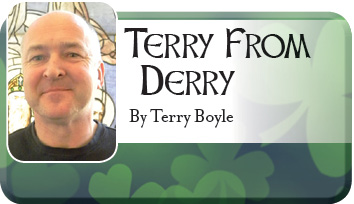

Terry from Derry: Hunkering Down
by Terry Boyle
I remember a good friend of mine, a Benedictine monk, would use a nice analogy to show how diversity of opinion can be good thing, if we recognize/use it to see our own limited viewpoint. It was an analogy that I would use myself in class.
When you’re standing up looking down at students, your view of the room is towards the back. They are looking up or behind you. We share the same room but we each have a different perspective of that same room. I could argue that my vantage point is the right one, and they equally could argue the same point. If we trusted each other enough and shared our differing perspectives, instead of pontificating about being right, we might find ourselves sharing information that would expand our view of the room.
It’s a very simple analogy but it captures the essence of diversity. Whether it’s religion, politics or any other controversial subject, there are many diverse viewpoints from a lot of different angles. Once you encounter a group who claim to have the whole truth, it’s time to leave them to their elitist monopoly of the truth and find a more grounded group of individuals.
In the bible there’s a saying, ‘the beginning of wisdom is fear of the Lord.’ If I can be creative in my interpretation of this verse, I would say that the beginning of wisdom is admitting to not being completely right. Humility requires an acknowledgment of limitations.
I remember as a child, before the Troubles began in Derry, we lived beside a Presbyterian family. There was no discussion about religious differences. Economically, we were all in the same boat, hard-up and living from hand-to-mouth. Friendships were easily established and, on the surface, we were all the same.
However, once it came to Sundays, things were different. After mass, we would play football in the park, the Presbyterians were Sabbatarians, so no footie for them.
On one occasion, they invited us to come with them on a church excursion. The idea of the church providing a day out for its families was incongruous to us. It’s funny how kindness and generosity can bring out the worst in our thinking.
For some reason, the trip highlighted the differences between us more than not playing football on a Sunday. For one thing, I was wondering why we didn’t have church outings or free lunches. Such questions led me to conclude, wrongly of course, that because they weren’t part of the one true church, Presbyterians had to compensated with ‘free stuff’.
My childish reasoning was, of course, indicative of a larger problem that would later escalate to even more insidious levels in Northern Ireland. Once the Troubles began, the religious and political differences became impossible to ignore.
Within a short period of time, neighbourhoods began to change. Protestants, fearing a backlash from the marauding Catholics, moved across the river to safer areas. Mixed areas quickly became singularly territorial and homogenous.
When sectarianism sets in, it is like a disease that destroys any sense of a common humanity. Everything people do from the other side is interpreted in the worst possible way. You become blinded to the goodness in those who are different.
When you feel under attack, the natural reaction is to be defensive, and this knee-jerk response exacerbates the divisions between communities. At such times, fact rarely matters; you’re willing to believe the urban myths, uncritically, because it allows you to justify your prejudice.
We all occupy the same room, but we see different things. Our vision is limited. Unless we’re willing to sit somewhere else, get a different perspective, or listen to someone else’s view of the room, we’ll continue to think and believe our view is the correct one.
This kind of thinking leaves no space for critical thought. All of our energy is spent in demonizing the other side and defending our own position. The cycle of anger and recrimination intensifies and can lead to darker levels of violence. When those corrosive attitudes set in any hope of communicating in an honest and open way is lost.
I’m reminded of Plato, Simile of the Cave, where a group of individuals are chained and bound together in a dark cave. None of them has ever seen daylight. When one prisoner escapes, he makes his way to the sunlight. His journey towards the light is fraught with fear and trepidation.
He is venturing on a path he’s never taken before. His curiosity drives him towards an experience that will change him for life.
When he realizes how much more there is to the world he returns to the cave to tell the others. They refuse to believe him. His good news is met with hatred. He is no longer is one of them, blind and bound, and must be alienated.
The quest towards enlightenment is not without risks. To step outside of one’s community and experience life on the other side changes you. Such a journey makes it almost impossible to share in the ignorance and bigoty of your own collective. To be different is to appreciate those who are different and who see things from another side of the room.
Life intrudes at times, and we lose our perspective. We can get caught up with the politics or religious tribalism of the times and we stop seeing people as people but rather as, Seamus Heaney puts it, ‘the other side of the house.’


Monthly newsmagazine serving people of Irish descent from Cleveland to Clearwater. We cover the movers, shakers & music makers each and every month.
Since our 2006 inception, iIrish has donated more than $376,000 to local and national charities.
GET UPDATES ON THE SERIOUS & THE SHENANIGANS!